
Baking is a method of preparing food that uses dry heat, typically in an oven, but can also be done in hot ashes, or on hot stones. The most common baked item is bread, but many other types of foods can be baked. Heat is gradually transferred "from the surface of cakes, cookies, and pieces of bread to their center, typically conducted at elevated temperatures surpassing 300°F. Dry heat cooking imparts a distinctive richness to foods through the processes of caramelization and surface browning. As heat travels through, it transforms batters and doughs into baked goods and more with a firm dry crust and a softer center. Baking can be combined with grilling to produce a hybrid barbecue variant by using both methods simultaneously, or one after the other. Baking is related to barbecuing because the concept of the masonry oven is similar to that of a smoke pit.
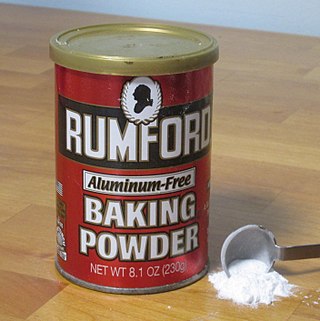
Baking powder is a dry chemical leavening agent, a mixture of a carbonate or bicarbonate and a weak acid. The base and acid are prevented from reacting prematurely by the inclusion of a buffer such as cornstarch. Baking powder is used to increase the volume and lighten the texture of baked goods. It works by releasing carbon dioxide gas into a batter or dough through an acid–base reaction, causing bubbles in the wet mixture to expand and thus leavening the mixture.

A muffin or bun is an individually portioned baked product; however, the term can refer to one of two distinct items: a part-raised flatbread that is baked and then cooked on a griddle, or a quickbread that is chemically leavened and then baked in a mold. While quickbread "American" muffins are often sweetened, there are savory varieties made with ingredients such as corn and cheese, and less sweet varieties like traditional bran muffins. The flatbread "English" variety is of British or other European derivation, and dates from at least the early 18th century, while the quickbread originated in North America during the 19th century. Both types are common worldwide today.

A biscuit, in many English-speaking countries, including Britain, Ireland, Australia, New Zealand, India, and South Africa but not Canada or the US, is a flour-based baked and shaped food item. Biscuits are typically hard, flat, and unleavened. They are usually sweet and may be made with sugar, chocolate, icing, jam, ginger, or cinnamon. They can also be savoury, similar to crackers. Types of biscuit include biscotti, sandwich biscuits, digestive biscuits, ginger biscuits, shortbread biscuits, chocolate chip cookies, chocolate-coated marshmallow treats, Anzac biscuits, and speculaas.
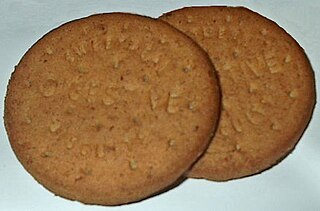
A digestive biscuit, sometimes described as a sweet-meal biscuit, is a semi-sweet biscuit that originated in Scotland. The digestive was first developed in 1839 by two doctors to aid digestion. The term digestive is derived from the belief that they had antacid properties around the time the biscuit was first introduced due to the use of sodium bicarbonate as an ingredient. Historically, some producers used diastatic malt extract to "digest" some of the starch that existed in flour prior to baking.
A bakery is an establishment that produces and sells flour-based baked goods made in an oven such as bread, cookies, cakes, doughnuts, bagels, pastries, and pies. Some retail bakeries are also categorized as cafés, serving coffee and tea to customers who wish to consume the baked goods on the premises. In some countries, a distinction is made between bakeries, which primarily sell breads, and pâtisseries, which primarily sell sweet baked goods.
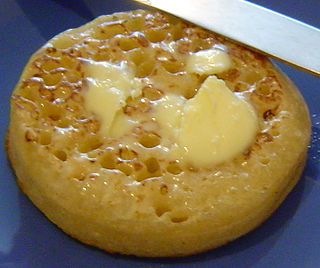
A crumpet is a small griddle bread made from an unsweetened batter of water or milk, flour, and yeast, popular in the United Kingdom, Australia, Canada, New Zealand, and South Africa.

August Oetker was a German inventor, food scientist and business person. He is known as the creator of baking powder as a ready-to-use product, and also as the founder of the Dr. Oetker company. He was the patriarch of the Oetker family.
Martha White is an American brand of flour, cornmeal, cornbread mixes, cake mixes, muffin mixes, and similar products.
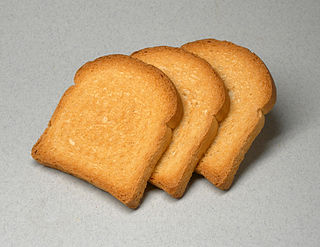
A rusk is a hard, dry biscuit or a twice-baked bread. It is sometimes used as a teether for babies. In some cultures, rusk is made of cake, rather than bread: this is sometimes referred to as cake rusk. In the UK, the name also refers to a wheat-based food additive.

Hovis Ltd is a British company that produces flour, yeast and bread. Founded in Stoke-on-Trent, it began mass-production in Macclesfield in 1886.

RHM plc, formerly Rank Hovis McDougall, was a United Kingdom food business. The company owned numerous brands, particularly for flour, where its core business started, and for consumer food products. It was listed on the London Stock Exchange and was once a constituent of the FTSE 100 Index but was acquired by Premier Foods in March 2007; many of its brands continue to be produced.

Premier Foods plc is a British food manufacturer headquartered in St Albans, Hertfordshire. The group owns many well-known brands, including Mr Kipling, Ambrosia, Bird's Custard, Angel Delight, Homepride cooking sauces, Lyons, Sharwood's, Loyd Grossman sauces, Oxo, Bisto, Batchelors and Plantastic. Premier Foods also produce cakes under the Cadbury's name, using the brand under licence. It is listed on the London Stock Exchange and is a constituent of the FTSE 250 Index.

Dr. Oetker is a German multinational company that produces baking powder, cake mixes, frozen pizza, pudding, cake decoration, cornflakes, birthday candles, beer, and various other products.
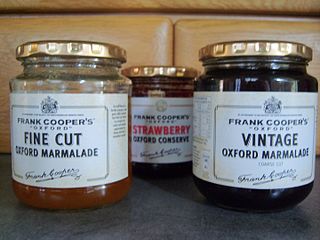
Frank Cooper's is a British brand of marmalades and jams owned by Hain Daniels. Frank Cooper's is known primarily for its "Oxford" Marmalade and holds a Royal Warrant. The brand was created by Sarah Cooper in 1874 and as of 2012 is a brand of Hain Celestial Group.

An oatcake is a type of flatbread similar to a cracker or biscuit, or in some versions takes the form of a pancake. They are prepared with oatmeal as the primary ingredient, and sometimes include plain or wholemeal flour as well. Oatcakes are cooked on a griddle or baked in an oven.
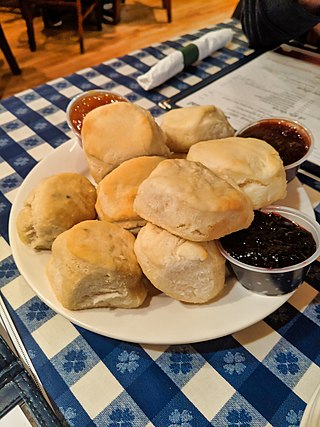
In the United States, a biscuit is a variety of baked bread with a firm, dry exterior and a soft, crumbly interior. In Canada it sometimes also refers to this or a traditional European biscuit. It is made with baking powder as a leavening agent rather than yeast, and at times is called a baking powder biscuit to differentiate it from other types. Like other forms of bread, a biscuit is often served with butter or other condiments, flavored with other ingredients, or combined with other types of food to make sandwiches or other dishes.

The Federal Pretzel Baking Company of South Philadelphia was the first large-scale mass production soft pretzel manufacturer in Philadelphia.
Fitch Lovell was a British food manufacturing, transportation, distribution and retail conglomerate with origins dating back to 1784. The company was purchased by Booker Group in 1990 for £279.7 million and during 1991 the business was merged into its parent.

A baking mix is a mixed formulation of ingredients used for the cooking of baked goods. Baking mixes may be commercially manufactured or homemade. Baking mixes that cater to particular dietary needs, such as vegan, gluten-free, or kosher baking mixes, can be bought in many places.
















